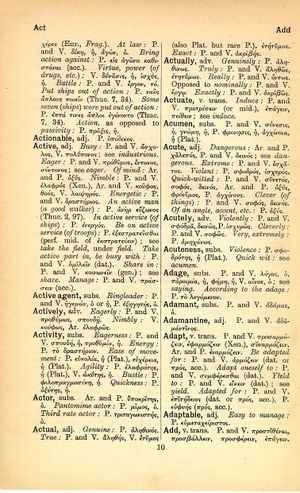acute: Difference between revisions
m (Text replacement - "(|thumb)\n(\|link=)" to "$1$2") |
m (Woodhouse1 replacement) |
||
| Line 1: | Line 1: | ||
{{Woodhouse1 | {{Woodhouse1 | ||
|Text=[[File:woodhouse_10.jpg|thumb|link={{filepath:woodhouse_10.jpg}}]] | |Text=[[File:woodhouse_10.jpg|thumb|link={{filepath:woodhouse_10.jpg}}]] | ||
===adjective=== | |||
[[dangerous]]: [[Aristophanes|Ar.]] and [[prose|P.]] [[χαλεπός]], [[prose|P.]] and [[verse|V.]] [[δεινός]]; see [[dangerous]]. | |||
[[extreme]]: [[prose|P.]] and [[verse|V.]] [[ἔσχατος]]. | |||
[[violent]]: [[prose|P.]] [[σφοδρός]], [[ἰσχυρός]]. | |||
[[quick-witted]]: [[prose|P.]] and [[verse|V.]] [[συνετός]], [[σοφός]], [[δεινός]], [[Aristophanes|Ar.]] and [[prose|P.]] [[ὀξύς]], [[φρόνιμος]], [[prose|P.]] [[ἀγχίνους]]. | |||
[[clever]] (of [[thing]]s): [[prose|P.]] and [[verse|V.]] [[σοφός]], [[δεινός]]. | |||
of an [[angle]], [[accent]], etc. [[prose|P.]] [[ὀξύς]]. | |||
}} | }} | ||
{{Lewis | {{Lewis | ||
Revision as of 08:52, 20 May 2020
English > Greek (Woodhouse)
adjective
dangerous: Ar. and P. χαλεπός, P. and V. δεινός; see dangerous.
quick-witted: P. and V. συνετός, σοφός, δεινός, Ar. and P. ὀξύς, φρόνιμος, P. ἀγχίνους.
clever (of things): P. and V. σοφός, δεινός.
of an angle, accent, etc. P. ὀξύς.
Latin > English (Lewis & Short)
ăcūte: adv., v. acuo,
I P. a. fin.
Latin > French (Gaffiot 2016)
ăcūtē¹² (acutus), de façon aiguë, perçante, fine, pénétrante : [avec l’idée de penser] Cic. Off. 1, 56 ; [de raisonner, disserter] Cic. Fin. 3, 2 ; Tusc. 5, 28 ; [de parler, d’écrire] Cic. Br. 108 ; Læl. 6 ; Verr. 2, 2, 20, etc. || acute cernere Lucr. 4, 810, voir distinctement (distinguer nettement) ; sonare Cic. Rep. 6, 18, avoir un son aigu ; audire Sol. 19, 11, avoir l’ouïe fine || -tius, tissime Cic.
Latin > German (Georges)
acūtē, Adv. m. Compar. u. Superl. (acutus), scharf, I) mit den Sinnen (Ggstz. obtuse), cernere, Lucr. 4, 807: dexteris oculis acutius cernere quam sinistris, Solin. 12, 13 M.: acutissime videre, Solin. 32, 28: acutissime audire, Solin. 19, 11. – vom Tone usw., hoch (Ggstz. graviter, tief), sonare, Cic. de rep. 6, 18. – II) mit dem Verstande, scharfsinnig, sinnreich, geistreich, treffend, dicere aut scribere, Suet.: acute arguteque ad haec respondere, Cic.: acutius tractare alqd, Cic.: acutius od. acutissime cogitare, Cic.: cum alii hoc faciant obtuse, alii acute, Augustin. doctr. Chr. 4, 5. § 7.
Latin > English
acute acutius, acutissime ADV :: acutely, with intellectual penetration; shrilly; clearly (seeing), distinctly

